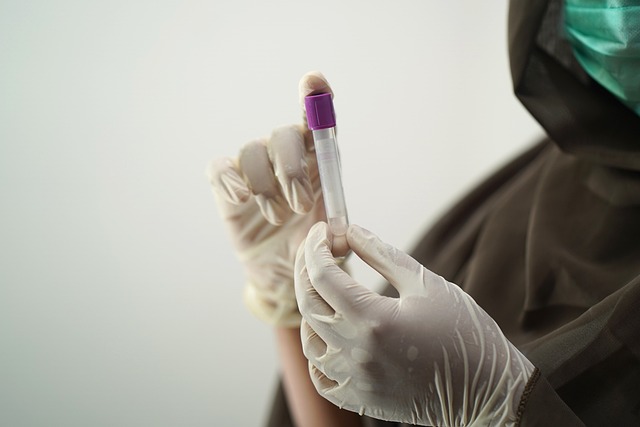The review emphasizes the essential role of standard liver function tests, which include measurements of enzymes like ALT and AST, proteins such as Albumin and Total bilirubin, and clotting substances like PT or INR, in diagnosing and monitoring liver health. These tests are crucial for early detection and management of conditions including hepatitis, cirrhosis, and liver cancer, significantly improving treatment outcomes. The article also underscores the importance of incorporating advanced diagnostic techniques, including imaging studies and specialized blood tests like the Advanced Thyroid Blood Test UK, to gain a comprehensive understanding of liver health in relation to systemic conditions. This multifaceted approach allows healthcare providers to tailor care strategies according to individual patient needs, ensuring precise diagnoses and effective management. The UK's innovative approach to thyroid disorders with sophisticated blood tests that measure TSH, FT4, and T3 levels has advanced the diagnosis and management of thyroid conditions, highlighting the interrelation between thyroid and liver health. These tests enable medical practitioners to monitor thyroid status, which indirectly informs their approach to liver health assessments. Regular monitoring and collaboration across medical disciplines are vital for accurate diagnoses and effective treatment plans, optimizing outcomes in patients with endocrine or hepatic concerns. The integration of the Advanced Thyroid Blood Test UK with conventional liver function tests represents a significant advancement in the holistic management of thyroid conditions and their impact on liver health. Understanding normal parameters for these tests and factors influencing them is critical for healthcare providers to accurately interpret results and provide personalized care.
This article serves as a comprehensive guide for medical professionals on the standard liver function tests, emphasizing the critical parameters assessed in these evaluations. It delves into the role of advanced thyroid blood tests within the UK’s healthcare landscape and explores their significant interplay with liver health. Medical experts will find valuable insights on interpreting liver function test results, with a particular focus on the implications of thyroid function for overall hepatic assessment. Key attention is given to the integration of ‘Advanced Thyroid Blood Test UK’ findings in clinical decision-making processes.
- Comprehensive Analysis of Liver Function Parameters in Standard Liver Tests for Medical Professionals
- The Role of Advanced Thyroid Blood Tests in the UK and Their Interplay with Liver Health
- Interpreting Liver Function Test Results in Clinical Practice: A Guide for Medical Experts
Comprehensive Analysis of Liver Function Parameters in Standard Liver Tests for Medical Professionals

For medical professionals, a standard liver function test is an essential diagnostic tool that provides a comprehensive analysis of liver parameters. These tests measure enzymes, proteins, and substances produced or stored by the liver to assess its overall health and detect any dysfunction. Key parameters such as Alanine aminotransferase (ALT), Aspartate aminotransferase (AST), Alkaline phosphatase (ALP), Gamma-glutamyl transferase (GGT), Total bilirubin, Albumin, and Prothrombin time (PT) or International Normalized Ratio (INR) are critical for evaluating hepatic function. These tests can help in early detection of liver diseases like hepatitis, cirrhosis, and liver cancer, which is crucial for successful treatment outcomes.
Advanced diagnostic techniques, including imaging studies and more specialized blood tests such as the Advanced Thyroid Blood Test UK, may be employed alongside standard liver function tests to provide a more thorough understanding of liver health in relation to other systemic conditions. The integration of these advanced tests allows healthcare providers to tailor their approach to each patient’s unique needs, ensuring accurate diagnosis and effective management of liver-related disorders. Medical professionals must stay abreast of the latest advancements in diagnostic methods to optimize patient care and outcomes in liver disease management.
The Role of Advanced Thyroid Blood Tests in the UK and Their Interplay with Liver Health

In the UK, the management of thyroid disorders has become increasingly sophisticated with the advent of advanced thyroid blood tests. These tests, which include measurements of thyroid-stimulating hormone (TSH), free thyroxine (FT4), and triiodothyronine (T3) levels, provide a comprehensive assessment of thyroid function. They are pivotal in diagnosing and managing conditions such as hypothyroidism, hyperthyroidism, and thyroid cancer, offering insights into the body’s metabolic processes. The interplay between thyroid health and liver function is noteworthy, as the thyroid gland and the liver share a complex relationship mediated by hormones and metabolism. Liver health can influence thyroid hormone synthesis and conversion, while thyroid dysfunction can affect liver enzymes and overall hepatic function. Healthcare professionals in the UK utilise these advanced thyroid blood tests to monitor thyroid status, which indirectly informs their approach to liver health assessments. This synergy is crucial for the holistic management of patients with thyroid conditions, as liver dysfunction can mimic or be masked by thyroid pathologies, necessitating a nuanced understanding of both systems’ interplay for accurate diagnosis and treatment. Regular monitoring and interdisciplinary collaboration are key to optimising patient outcomes in the context of endocrine and hepatic health.
Interpreting Liver Function Test Results in Clinical Practice: A Guide for Medical Experts

In clinical practice, interpreting liver function test results is a nuanced task that requires an understanding of normal reference ranges and the potential influence of various factors such as diet, medication use, and underlying health conditions. Medical professionals must consider the patient’s clinical context, including symptoms, history, and other laboratory findings, to accurately assess liver function. The tests commonly include measures of liver enzymes like Alanine Aminotransferase (ALT) and Aspartate Aminotransferase (AST), bilirubin levels, albumin, globulin, alkaline phosphatase, gamma-glutamyl transferase (GGT), and prothrombin time or international normalized ratio (INR). These tests can reveal hepatic inflammation, damage, obstruction, or infiltrative disease processes. For instance, elevated GGT levels may indicate liver cell damage or bile duct problems, while abnormal ALT and AST levels can suggest hepatocellular injury. It is also imperative to monitor the trends of these test results over time to detect subtle changes that may be indicative of disease progression or response to treatment. Additionally, medical experts should be aware of advanced tests such as the Advanced Thyroid Blood Test UK, which can provide comprehensive insights into thyroid function and its potential impact on liver health, given the interplay between thyroid hormones and liver enzymes. By integrating these advanced tests with traditional liver function assessments, healthcare providers can offer personalized and precise care for patients with suspected or confirmed liver dysfunction.
Medical professionals have a critical role in interpreting liver function tests to diagnose and manage hepatic disorders effectively. The comprehensive analysis of liver function parameters within standard liver tests provides a foundational understanding necessary for accurate diagnosis. Additionally, the interplay between advanced thyroid blood tests in the UK, as highlighted in the article, underscores the importance of considering endocrine factors in assessing overall health. By integrating these insights into clinical practice, healthcare experts can enhance patient care and outcomes. The guidance offered in the article for medical experts on interpreting liver function test results will undoubtedly aid in the early detection and management of liver diseases, potentially improving prognoses and quality of life for patients.
